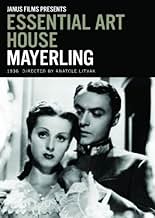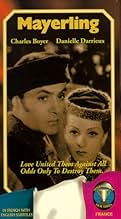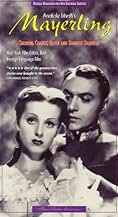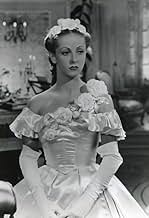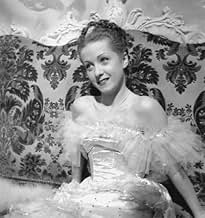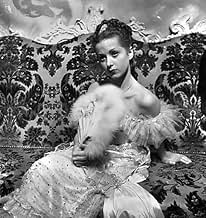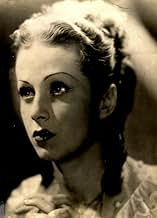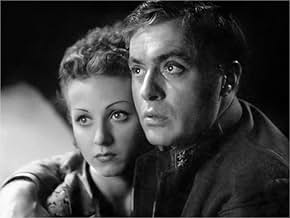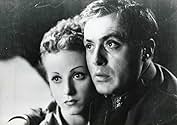Agrega una trama en tu idiomaRodolfe, Crown Prince of Austria, is fettered on all sides. He's bored; his father, the emperor, is domineering; his politics are more liberal than his father's, but he knows his views carry... Leer todoRodolfe, Crown Prince of Austria, is fettered on all sides. He's bored; his father, the emperor, is domineering; his politics are more liberal than his father's, but he knows his views carry no weight. He agrees to marry a princess to sire an heir, then spends his nights as a pla... Leer todoRodolfe, Crown Prince of Austria, is fettered on all sides. He's bored; his father, the emperor, is domineering; his politics are more liberal than his father's, but he knows his views carry no weight. He agrees to marry a princess to sire an heir, then spends his nights as a playboy. In 1888, he meets Marie Vetsera, 17, a baroness' daughter. She is resolute, smitten,... Leer todo
- Dirección
- Guionistas
- Elenco
- Premios
- 3 premios ganados y 1 nominación en total
- La baronne Vetsera
- (as Marthe Regnier)
- La cousine de Marie
- (as Assia)
- Une fille
- (as Ribès)
- Szeps
- (as Bergeron)
- Le chef de la police
- (as Sokoloff)
- Le premier policier
- (as Aimos)
- Le second policier
- (as Siméon)
Opiniones destacadas
In this French-language version by Ukranian director Anatole Litvak, we get a highly-romanticised version of the story with Charles Boyer and Danielle Darrieux as the star-crossed but ill-fated lovers.
The direction throughout is stylish and tasteful, Litvak impressing in his recreation of the Viennese Court with its surface splendour barely concealing the jostling for position and rumour-mongering beneath the facade. Boyer and Darrieux are excellent in their lead roles, his character the reforming, rebellious heir to the throne, unhappy in his arranged marriage and she the youthful, highly-impressionable innocent caught up in the first great passion of her life.
The concluding climax is sensitively and humanely depicted too with my only major criticisms of the film being an over-reliance on the use of the no-doubt in-vogue montage sequences and a tendency to slightly overstay the camera's welcome in certain scenes.
Nevertheless, this was a fine retelling of the notorious scandal and it's no surprise that its artistic and commercial success lured director Litvak to Hollywood where he enjoyed a distinguished career for many years.
Opening thoughts: There were plenty of reasons for seeing 'Mayerling'. Have always loved period dramas, and especially when it is a period of history that really piques a lot of interest. Having gained a major interest in Austrian royalty since my holiday to Vienna last year (especially Empress Elisabeth, aka Sissi), this was one such period. It also intrigued seeing Charles Boyer in an early role and the kind that he became well known for and for seeing one of Anatole Litvak's early films.
'Mayerling' is a very, very good film indeed. Not perfection, but there are numerous good things and most of those good things are actually exceptional. Of the two 'Mayerling' films seen, the other being the one from the 50s, this is infinitely better with it actually being good (was underwhelmed by the other). It is very easy to see why Boyer became a major international star after this and the film is one of Litvak's best and most interesting early films (the film that also helped make his career bigger), as far as his films in general go it's not quite 'All This and Heaven Too' and especially 'The Snake Pit' but it is in the better end.
Bad things: It isn't perfect. Will agree that Gabrielle Dorziat wasn't right for Elisabeth, she came over as too old and didn't get enough of the ahead of the time astonishing beauty that Elisabeth was famous for the struggles she faced in her life.
Also thought that the lead up to the tragic conclusion was too overlong and dragged out.
Good things: However, 'Mayerling' looks absolutely ravishing, with sumptuous costume designs and art direction and the photography is some of the most beautiful of any film from the late 30s. Was not sure as to whether Arthur Honegger's music would gel stylistically and in mood, but it is suitably dramatic without being bombastic or too melodramatic and is quite lush. Litvak's direction is some of his most stylish and sensitive.
Furthermore, the script is thought provoking and doesn't go into soap opera territory too much. There may be cliches here but they are not done in too cliched a manner. The story always intrigues, even in the slower patches, and has emotional impact and very passionate romance. The conclusion itself is very moving and the love is very deeply felt.
Boyer and Danielle Darrieux are both perfectly cast, giving performances of great dignity and passion. Their chemistry smolders. The supporting cast are excellent too, with reservations had for only Dorziat.
Concluding thoughts: Overall, very, very good.
8/10.
Anatole Litvak does not pass over in silence Rudolph's dissoluteness, as two orgy scenes testify.Besides,Charles Boyer is a much better archduke than Omar Shariff.Ditto Danielle Darrieux who was about 20 (whereas Catherine Deneuve was nearing 25 when she played Mary),thus a more credible baroness Vetsera .Both versions,it's important to notice ,are from Claude Anet's NOVEL.It's not a historian's work and it should be not looked upon so.
However,Litvak is a better director than Terence Young.With a much smaller budget,and of course without the 1968 technical aids ,he works wonders :the tiny church where Rudolph meets Mary in half-light creates a mystical and heathen atmosphere at once.The night at the opera house is dazzling.To conclude the scene of the ball at the German embassy ,the artist uses a stunning tracking out which leaves the swirling twirling dancers,then stops on a glass door adorned with the Habsburg emblem.Rudolphe ,firing at his reflection in a mirror is an adequate metaphor.
A minor flaw:Gabrielle Dorziat is completely miscast as Sissi ,Rudolph's mother:she was one of the most beautiful women of her time (we can see the magnificent Winterhalter portraits at the beginning of the movie).At fifty,when the Mayerling tragedy occurred,her beauty was still incomparable.She had nothing to do with the aging dowager we see on the screen (in Young 's version,it's Ava Gardner!)
And hats off to Danielle Darrieux who ,sixty-four years after "Mayerling" ,recently triumphed in "8 femmes",a blockbuster in France.Any advance?
¿Sabías que…?
- TriviaOne of the first foreign films with sound to become a hit in the United States. It made an international star out of Charles Boyer.
- ConexionesFeatured in Scissors (1991)
Selecciones populares
Detalles
Taquilla
- Total en EE. UU. y Canadá
- USD 240,000
- Tiempo de ejecución
- 1h 36min(96 min)
- Color
- Relación de aspecto
- 1.33 : 1

